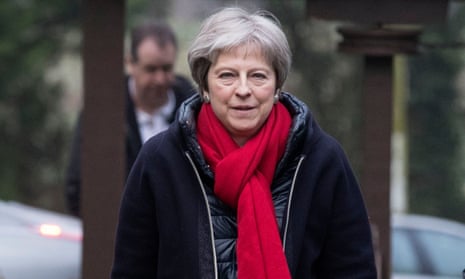The Cambridge Analytica scandal engulfing the official Brexit campaign reached No 10 on Sunday, as campaigners wrote to Theresa May demanding an investigation into what members of her cabinet and her own staff knew.
The letter from the anti-Brexit group Best for Britain came after a whistleblower told the Observer that Vote Leave channelled money through another campaign to a firm linked to the controversial data company Cambridge Analytica in a potential breach of electoral law.
The allegations immediately put pressure on the foreign and environment secretaries, Boris Johnson and Michael Gove, who were leading members of Vote Leave.
May came under pressure herself over the weekend after Downing Street was accused of outing the whistleblower, Shahmir Sanni, as gay in an official statement released on Friday. It was put out in response to allegations Sanni made about the involvement of one of May’s aides, Stephen Parkinson – a former senior Vote Leave official – in wrongdoing at the campaign group.
Sanni said his family in Pakistan, where homosexuality is criminalised, are now in potential danger.
Sanni had raised questions with the Observer about the validity of a £625,000 donation from Vote Leave to an ostensibly independent campaign group called BeLeave was channelled to the digital services firm, AggregateIQ (AIQ), which has links to Cambridge Analytica.
In its letter, Best for Britain demanded to know:
- What did Michael Gove and Boris Johnson know about the coordination of the Leave campaign and AIQ? Is the prime minister planning to investigate what they knew about the claims?
- Will the pair be recused from the Brexit “war cabinet” while these claims are being investigated?
- Does the prime minister plan to investigate the staff mentioned in the reports who work for No 10?
- Did No 10 directly out Sanni, or have any involvement in his outing?
- Were government emails, phones or equipment used?
The letter came after the latest in a string of revelations emerged about the work of the leave campaigns and the data firm Cambridge Analytica.
The £625,000 donation was, Sanni alleged, in breach of electoral rules because Vote Leave shared offices with BeLeave and exerted a measure of control over the smaller organisation. The rules require campaign groups that coordinate with each other to have a shared spending limit. Vote Leave has denied any such coordination.
Sanni also alleged that, after the Electoral Commission opened an investigation, senior Vote Leave figures began deleting traces of their presence in files shared by the two groups. The official Brexit campaign’s director, Dominic Cummings, described that claim as “factually wrong and libellous”. Vote Leave said staff acted “ethically, responsibly and legally in deleting any data”.
In a separate interview with Channel 4 News, Sanni said: “I know that Vote Leave cheated ... I know that people have been lied to and that the referendum wasn’t legitimate.”
He added: “In effect, they used BeLeave to overspend, and not just by a small amount ... Almost two-thirds of a million pounds makes all the difference, and it wasn’t legal.”
The claims were quickly dismissed by senior Vote Leave figures.
On Saturday evening, within hours of the news breaking, Johnson labelled the allegations “utterly ludicrous”, saying Vote Leave won the 2016 referendum “fair and square – and legally”.
The environment secretary, who served as the campaign’s co-chair, chose not to address the claims of maladministration, but to recast them as an attack on the electorate’s decision.
“I respect the motives and understand the feelings of those who voted to remain in the EU. But 17.4 million opted to leave in a free and fair vote and the result must be respected. It’s our job now to work to overcome division,” Gove said.
Andrea Leadsom, the leader of the Commons and a prominent Vote Leave campaigner, was more circumspect than the foreign secretary, telling Sky News: “It is, obviously, a matter for the Electoral Commission. It’s very important that they do look at these issues. I know that there have been a number of investigations already where there haven’t been findings of wrongdoing.”
Asked if she felt the legitimacy of the referendum result would be in doubt if the allegations were proven true, she said: “I think we need to wait for the Electoral Commission to have its investigation.”
The claims were also dismissed by Parkinson, in a personal statement released by No 10. In it, he called Sanni’s allegations “factually incorrect and misleading”.
Downing Street refused to say on Sunday whether May continued to have full confidence in Parkinson. A No 10 source said the question would have to wait until Monday.
Parkinson is one of a number of key figures likely to be considered by the commission’s investigation who now hold senior posts in May’s government. He could also face pressure to step aside voluntarily while the investigation is carried out.
On Sunday, Labour’s deputy leader, Tom Watson, told BBC One’s The Andrew Marr Show: “Theresa May needs to make sure the Electoral Commission has the resources to fully investigate the allegations made that there was criminal collusion.
“Because, let’s remember, the people that led these campaigns are now senior cabinet members, and I think we need to make sure that they were not aware of what was going on, and that’s why I think the resources are needed, and if needs be, the police should be resourced to investigate as well.”
An Electoral Commission spokeswoman said: “The commission has a number of investigations open in relation to campaigners at the EU referendum; it does not comment on live investigations.”
The Observer
The Observer is the world's oldest Sunday newspaper, founded in 1791. It is published by Guardian News & Media and is editorially independent.









